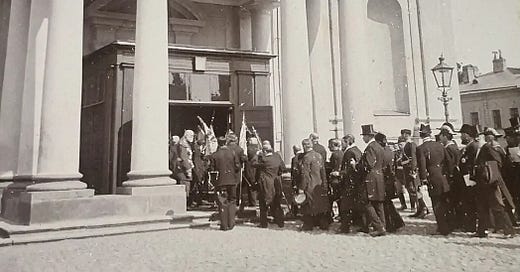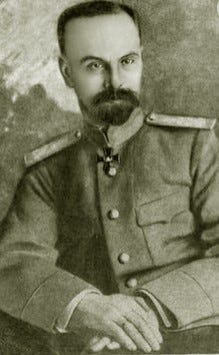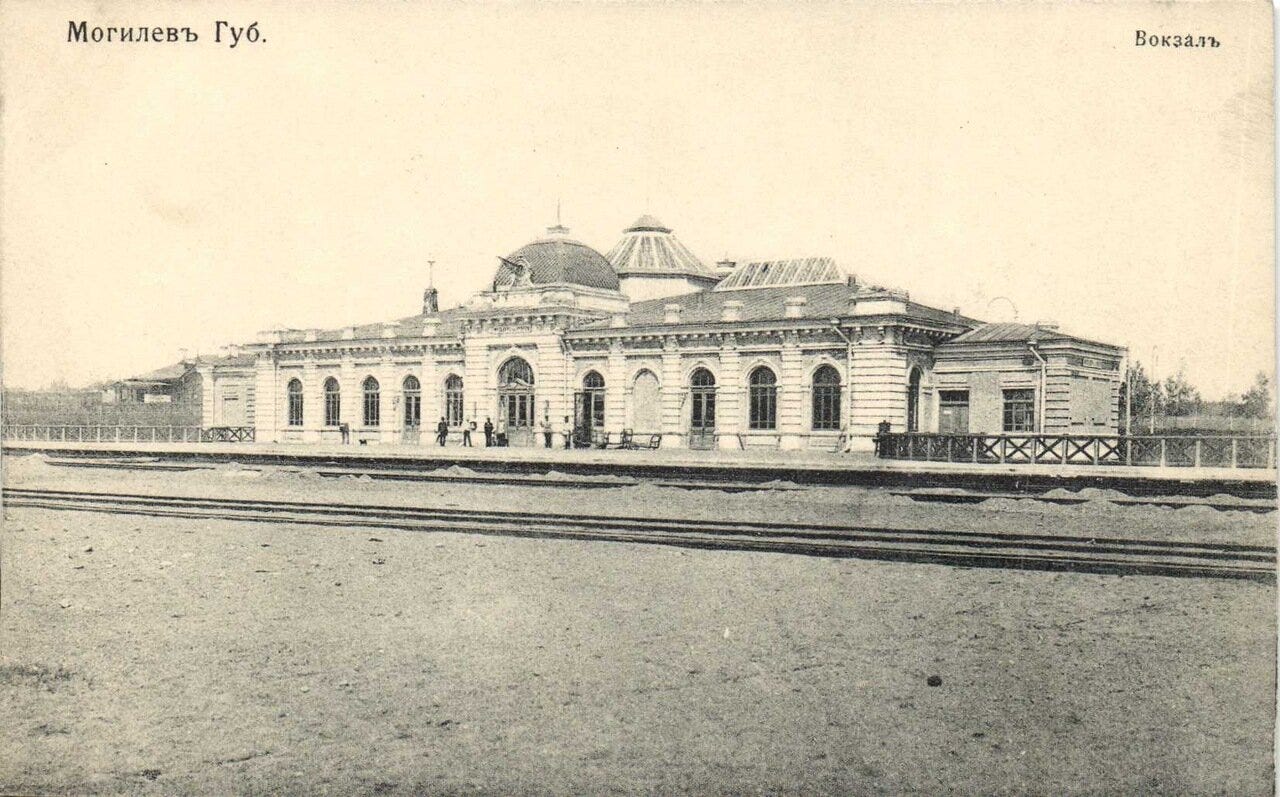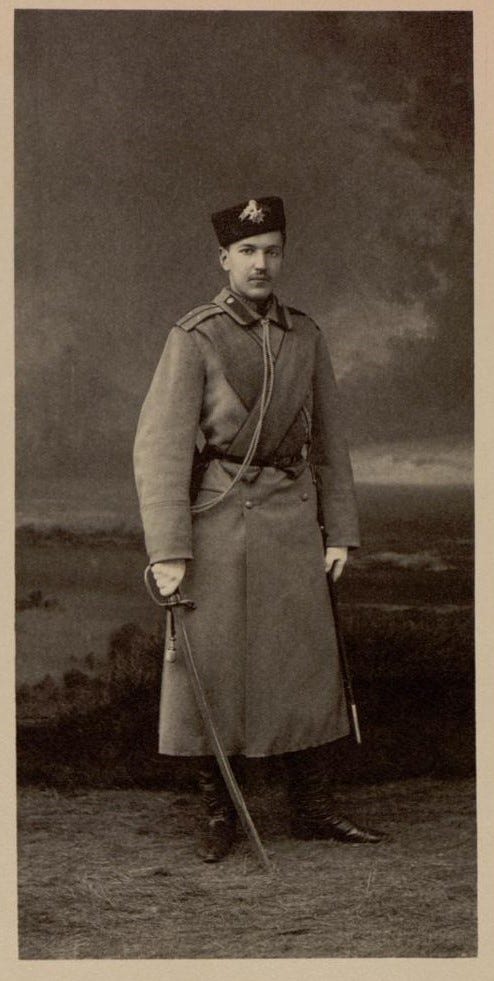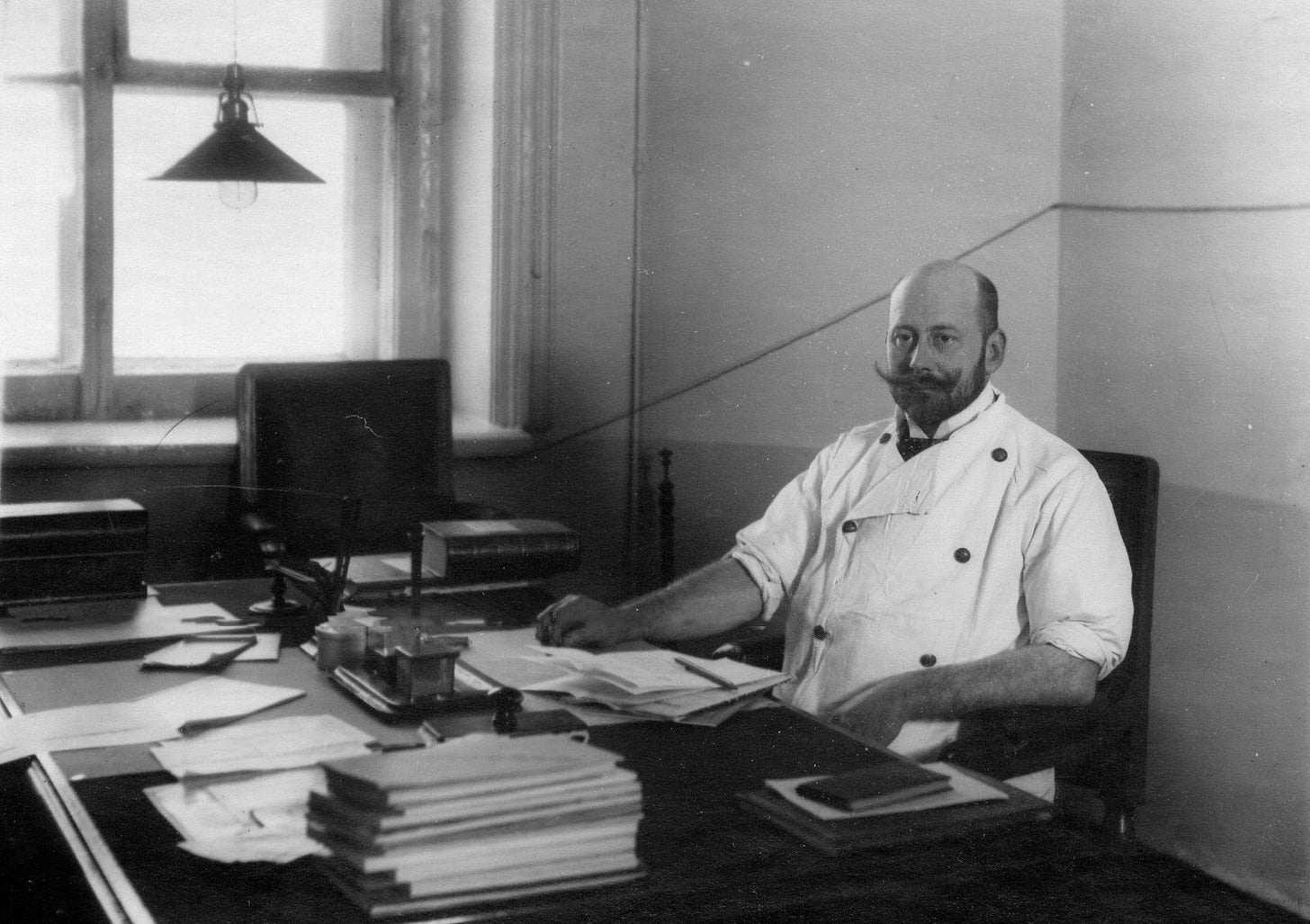Semyon Semyonovich Fabritskii: "The Most Precious Moments of My Life..."
Part 6: Continued Annotated Excerpts from "Memoirs of the Fligel-Adjutant to Nicholas II."
PART VI
Fabritskii picks up his narrative of involvement with the Imperial Family in 1909:
“I was appointed to serve under the Duke of Södermanland (1) and his spouse, Grand Duchess Marie Pavlovna (2), who were coming to St. Petersburg for the funeral of Grand Duke Michael Nikolaievich (3), who died unexpectedly in Nice.
“I had to leave for Abo (4), where I met the Distinguished Guests. At the very first meeting, the Grand Duchess made the most charming impression, which could not be said about Her Spouse.
“Upon arrival in St. Petersburg, the Grand Ducal Couple was met by the Grand Duchess's August Brother Grand Duke Dmitri Pavlovich (5), who invited everyone to breakfast at his palace before moving to Tsarskoye, where Grand Duchess Elizabeth Feodorovna (6) was also present, and to whom I had to introduce myself for the first time.
“After breakfast we moved to Tsarskoye Selo to His Majesty's own Palace, where rooms were reserved for the Distinguished Guests, and for my retinue and myself in the Grand Tsarskoye Selo Palace....It is pleasant to remember with what respect and love the persons treated their new Duchess, praising her in every possible way, telling how popular she began to be among the courtiers and the people in Sweden, how quickly she learned to speak Swedish and learned all the customs and traditions. At the same time, they spoke far from sympathetically about their Duke, accusing him of heartlessness, laziness, frequent rudeness, and negligence towards his young wife. The stay of Their Highnesses in Tsarskoye Selo lasted 15 days and proceeded in the intimate circle of the Imperial Family, with rare trips to St. Petersburg to pay the necessary visits....
“On the way back, the 4th Finnish Rifle Battalion, located in Abo, taking advantage of the need for Their Highnesses to stay in the city from morning to evening while waiting for the departure of the steamer to Stockholm, greeted those departing with a ceremonial breakfast in the officers' meeting, at which the young Grand Duchess showed a lot of tact and the ability to behave in society.”
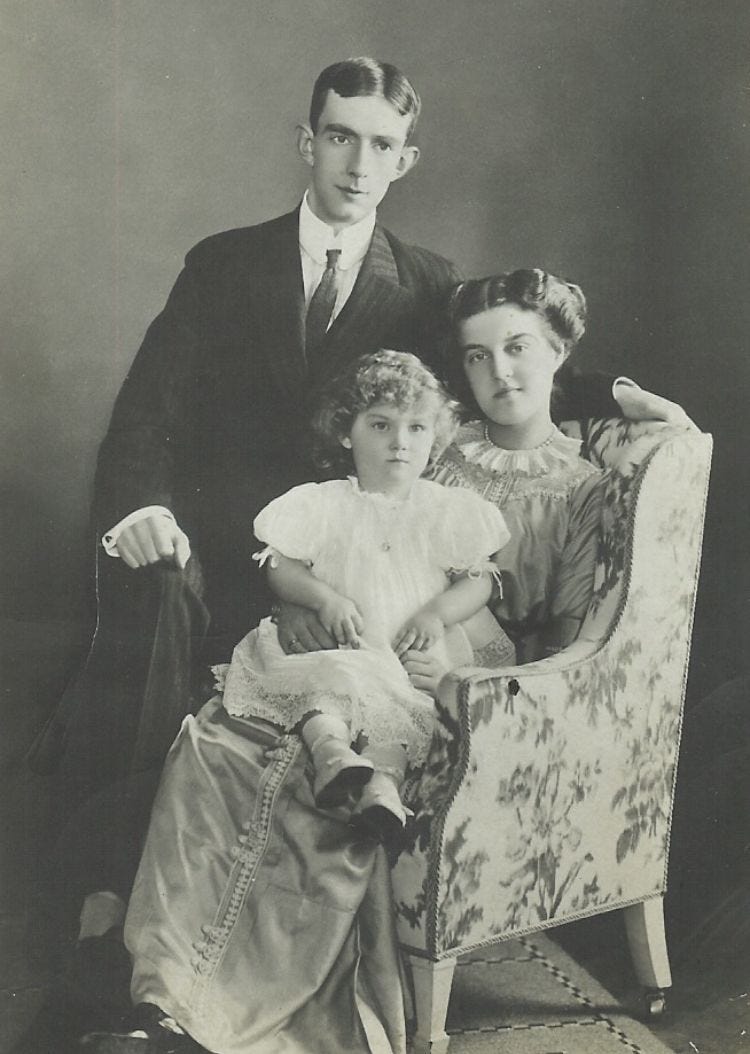
Fabritskii next recounts some of the jealously and malicious gossip directed his way:
“An incident occurred, which was entirely based on human envy and malice on the one hand, and on the other hand, the consciousness of impunity due to the infinite kindness of the Sovereign.
“Shortly after my appointment as Fligel-Adjutant, I was constantly aware of and experienced the hostility of very many fellow crew members, both my seniors and my equals. It all intensified as the Court favored me more and my promotions increased. After my stay, as it were, as a guest in Livadia, it reached its climax....Many hoped to also be appointed Fligel-Adjutant and thus weaken my supposed influence on the Sovereign....Offended, they attributed their non-appointments to my influence, not realizing that I, as an officer of the unit, was myself struck by this fact, knowing among the officers quite worthy of the award, both for their personal merits and for their position in society.
“All this broke out into an ugly intrigue waged against me by a group of officers who did not know that a petition had already been filed for my appointment to the fleet. The attack of my personal enemies was not crowned with success, but it cost me a lot of nerves and heavy, undeserved experiences, as a result of which I was forced to take offense at the entire naval unit, which was so dear to me, although ninety percent of its personnel were absolutely innocent.
“At this time, Their Majesties and Family were abroad for the treatment of the Empress. Immediately upon his return, the Sovereign demanded that the Commander of the Garde Equipage personally report to him about this intrigue. I gave explanations to the Minister of the Court, who had already become acquainted with the case from written documents. After listening to me, Adjutant-General Count Fredeericksz said something like this, 'I am surprised at the behavior of the crew commander. As for the people who were intriguing against you, it has long been clear to me that many of them dreamed of being appointed Fligel-Adjutant. It is not for me to judge the actions of my Sovereign. There were some reasons why none of them were appointed. Their envy towards you and hostility is understandable. I consider your behavior to be quite correct and I congratulate you from the bottom of my heart on the completion of this case.'
“Then I had the good fortune to have an audience with the Sovereign, who in gracious terms conveyed to me his regret that such a nuisance had befallen me, and asked me not to worry, since he fully approved of my behavior.
“In His kindness, His Majesty completely lost sight of the fact that it was impossible to leave unpunished officers who raised a case against their superior and did not prove his guilt, and that the same persons spread all kinds of rumors about me, even assuring me that I was to be removed from the crew by a court of honor. Despite the complete absurdity of such a statement, since an officer removed by a court of honor could not have been promoted and remain a Fligel-Adjutant, many always willingly believed any dirt and gossip.”
In 1911 Fabritskii asked Nicholas II about spreading gossip that the annual Imperial Naval reviews were to be canceled:
“'Who told you this?' the Emperor asked excitedly. Not wanting to let my superior down, I reported to His Majesty that there was a persistent rumor in the Navy about such a repeal due to the petition of the authorities in charge....The Sovereign said, 'Tell all the ranks of the detachment that the reviews will be mandatory and no one will be able to persuade me to cancel them.' No matter how trifling this case, it is indicative of the fact that as early as 1911 the top authorities began to fall under the influence of circles that carried out propaganda against the Monarchy under the guise of dissatisfaction with the Reigning Emperor.”
Fabritskii describes a developing situation in 1913:
“Around this time, I was surprised to hear about the appearance at the Court of a dark personality in the person of Rasputin and about his influence. Fortunately for me, I never had a chance to see this gentleman, and even more so to be acquainted with him, which did not prevent me, however, from continuing to enjoy the favor of the Sovereign.
“I categorically confirm that Rasputin, if indeed he wrote his notes to various ministers with all sorts of requests, never did so with the Minister of the Navy, Admiral Grigorovich, and had no influence on the fleet, causing only disgust among the ranks of the navy. Rumors about his closeness to the Court, about his influence on the Empress, about the miraculous healing of the Heir Tsesarevich during the bleeding all intensified. Taking advantage of my friendly relations with the life physician Ostrogorsky, I personally asked him if the talk about the healing of the Heir by Rasputin was true. Ostrogorsky categorically denied this, telling in detail how he personally assisted the Heir and stopped the blood.
“After all the private investigations, it became clear to me that Anna Vyrubova played a huge role in the Rasputin case, constantly receiving the latter at her house and thus gave the Empress the opportunity to meet with him.
“At that time, society and the press began to talk intensely about the inevitability of war with Germany, which, together with Austria, was only waiting for a pretext for opening hostilities. Visiting the Sovereign every month for a whole day, having lunch and breakfast with Their Majesties, I never once heard from them any fears on this score, since apparently the Sovereign believed in the prudence of Emperor Wilhelm and his constant statements about the undesirability of war. Personally, the Sovereign, of course, was an ardent opponent of war, realizing how hard it would be for a country like Russia, so little prepared in technology and industry, with a poorly equipped army and the beginning of construction of new navy ships, to respond in any conflict.”
In 1915 Fabritskii was again on temporary duty at Tsarskoye Selo:
“As soon as I entered the drawing room, where a luncheon table to which I had been invited was set, the Sovereign entered the same room, greeted me and congratulated me on my new appointment, saying that the commander of the fleet could not have made a better choice. I had only to submit and bring gratitude to His Majesty.
“Having not seen Their Majesties and the family for about ten months, I was amazed at the change that involuntarily caught my eye. The Sovereign and the Empress, who devoted herself entirely to caring for the wounded, looked very tired and preoccupied, and the Sovereign had visibly aged. The Grand Duchesses had become young ladies, still charming but easier to interact with. The Heir Tsesarevich had grown up a lot, matured, and stopped being naughty, as he used to be. Luncheon and dinner passed quietly in the family circle, with a hint of sadness and concern.”
Fabritskii saw Nicholas II for the last time in October 1916, when he arrived at Mogilev, where the Russian Army had moved its headquarters, to report to the Emperor. He recalled:
“I drove to Headquarters, where I hoped to see the Sovereign, whom I had not seen for about a year. The collapse going on everywhere, the bacchanalia of speculation and revelry in St. Petersburg, gossip and rumors, outrageous speeches in the Duma – all this painfully echoed in my soul, and I supported my Sovereign Leader, burning with the desire to see him and get acquainted with those around him.
“The train approached Mogilev around 11 am. Having stepped onto the platform, I noticed some group of people meeting us near the last carriage of our train. It turned out that at the end of the train was the car of the Minister of the Interior Protopopov (7). I wanted to take a look at this person, who already enjoyed some infamy, and I remained on the platform, waiting for the entire group to pass me. I looked at the approaching people and could not understand where the minister himself was, since the whole group consisted exclusively of the military. As it approached, I realized that the Minister had decided to wear the uniform of a Police general. For me, this alone was enough to treat him with complete distrust. According to his position, he had the right to this uniform and, of course, in certain cases he was obliged to wear it, but not during a trip with a report to the Sovereign.
“Appearing to the Chief of the Naval Supreme Staff and his flag-captains, I was amazed at the ease of receiving an invitation to the Highest Table, since I was not extended such an invitation from the marshal's office, but was simply informed by telephone that I would have lunch. For breakfast, we went to the Staff Canteen, where I had the opportunity to meet the Chief-of-Staff to the Supreme Commander-in-Chief, Adjutant-General Alexeyev (8) and his closest associates. A sad impression was made on me by a thin, sickly general, in whose hands almost all the fullness of power was concentrated. There was little faith in its power and scope.
“After breakfast, I paid a visit to His Majesty's field office and His Majesty's flag-captain Nilov, from whom I learned difficult news. According to him, treason reigned all around and the Sovereign was surrounded by unworthy or unsuitable people. Unfortunately, this was close to the truth, since the Palace Commandant was an experienced courtier, General Voeikov (9), and the head of the field office was the very nice but very odd Colonel Naryshkin (10). There was neither the brave and resolute Prince Orlov, nor the truthful and industrious Colonel Drenteln.
“At 8 o'clock the Supreme Dinner took place, during which I had the good fortune to sit almost opposite the Sovereign and watch see him without interruption. At dinner was also the Minister of the Interior Protopopov, who was constantly ridiculed by the Grand Dukes George and Sergei Mikhailovich (11) throughout the dinner.
“At the end of dinner, the Sovereign asked me for a long time and graciously in every detail about the brigade, its needs, position, etc., wishing me a successful formation and a speedy exit to the front.
“Having bid the Sovereign farewell, I went with Adjutant General Ivanov (12), former Commander-in-Chief of the Southwestern Front, to his train carriage, where I spent the evening in a peaceful conversation about current affairs. Again, I had to listen to many complaints about the Chief-of-Staff of the Supreme Commander-in-Chief, about the circle of the Sovereign, and about wrong decisions, being made.
“I paid a visit to the flag-captain Nilov and found him in despair. Deeply devoted to the Sovereign, the Admiral clutched his head and repeated incessantly, 'It's all over. We are dead. Treason is all around, no one listens to the Sovereign anymore and there is no person who could report this to His Majesty and convince him of this.' When I asked what the people around the Sovereign were doing, Nilov replied, 'Of all those around, only one, Doctor Fedorov (13), is an honest person, but he is a doctor.'
“I left Nilov with despair in his soul, realizing the truthfulness of the Admiral's words at almost every step
“At dinner, the Emperor met me, as always, graciously, but from the very first words I noticed a huge outward change in him. He was now very old and wrinkled. Sitting almost in front of His Majesty and keeping my eyes on Him, I could not help but notice his terrible nervousness, which I had never seen before. It was evident that the Sovereign's heart was heavy and that he could not hide this worry from those around him.”
Fabritskii concludes his memories and thoughts about the Imperial Family on learning of the Emperor's abdication:
“There were literally no signs of an impending revolution. No one was thinking about it when suddenly a pale chief-of-staff flew into my office like a hurricane and handed over ominous telegrams from the commander of the fleet with the news of the abdication of the Sovereign and the transfer of the Throne to Grand Duke Michael Alexandrovich. The telegrams were composed in vague terms, and from them one could clearly understand only the fact of the abdication and accession to the Throne of the new Emperor. Therefore, immediately the troops on site swore allegiance to the Sovereign Emperor Michael Alexandrovich. Complete order reigned everywhere, but some general depression was felt, as if before a thunderstorm....
“Finally, a cable came announcing Grand Duke Michael Alexandrovich's abdication as well. Everything was in a state of confusion. It was absolutely impossible to understand to whom all the fullness of the Supreme Power had passed, and it became clear that the end had come.
“I would like to know what the organizers of the revolution and the abdication of the Sovereign thought and how they imagined the future. Apparently, everything seemed to them some kind of holiday, in which they would play leading roles, bursting into beautiful speeches in front of a crowd crying with happiness. When you think that the organizers of this “bloodless revolution” were not high school students, girls, or inexperienced, beardless youths, but venerable generals, statesmen and the chairman of the State Duma, then their short sightedness and ignorance of the Russian people become completely incomprehensible.
“How right the Sovereign was when he treated them all with distrust, and how difficult it was for the Sovereign to choose his assistants when there were no people around. Even worse, in this nightmarish business of persuading the Sovereign to abdicate and in sympathy with the revolution, the Grand Dukes also took part.
“May the reader forgive my inept and concise presentation. I wanted to write differently. Write in such a way that everyone, when reading, would clearly understand the bright personality of the Sovereign Emperor Nicholas II and his wife, as well as our common irreparable guilt before them, who devoted all their strength to the service of our Motherland and gave their lives, their family and loved ones for our people.
“The time will come when impartial history will pay tribute to the Greatest of the Russian Tsars of the House of Romanov, during whose reign, despite the complete absence of capable assistants and the conduct of two bloody wars, Russia took colossal steps along the path of progress and enrichment.
“Now it is no secret to anyone that Russia was on the eve of a complete victory and, had it not been for the betrayal of those closest to the Throne, the European War would have ended brilliantly and Russia would have been the first Power in the world and its people the richest.
“Bringing the war to an end, Russia would be indebted to the Sovereign Emperor alone. He was the only one who did not lose his presence of mind until the last day, did not know fatigue or a decline in energy. Always it was the same unchanging smile, always affectionate and infinitely kind. The Sovereign, having assumed full responsibility, surrounded entirely by ill-wishers or arrogant slaves, but calmly did his job, like a sentry on duty.
“We can safely say that the Sovereign was the only person in Russia who stubbornly wanted to bring the war to a victorious end, which was one of the reasons for his death. And malicious people claimed that the Sovereign was a weak-willed person.
“Some kind of evil fate hung over the Sovereign, and no one was able to prevent predestination. This was expressed even in trifles, and as soon as the Sovereign planned something in advance, circumstances would make the fulfillment of this impossible.
“Once, when I was on duty, I received from a court runner a large sealed envelope personally from Their Majesties. Having opened it, I found a photographic group: the Sovereign, the Empress and the Heir, taken on the deck of the Standart, with handwritten signatures. When I expressed my deep gratitude for such a high favor, the Sovereign said, 'This is in memory of our past joint voyages and, I hope, more to come.'
“When the commander of the Imperial yacht Standart, Rear-Admiral Chagin, committed suicide for reasons still unclear, I commanded a destroyer in the 1st mine division. I unexpectedly received a call from the flag-captain of His Majesty, Admiral Nilov, to come to him in Tsarskoye Selo, and at the meeting he told me about his last conversation with His Majesty regarding the appointment of a new commander on the yacht. It turned out that I was the only candidate for the Sovereign. True, I immediately asked the admiral not to appoint me to this post, since it is associated with inevitable extra expenses that would naturally burden my budget, which is why it seemed as if I myself had rejected the appointment. In fact, there is no doubt that I would not have been appointed anyway, since there would be many jealous and spiteful people.
“Emperor Nicholas II reigned for twenty-two-and-a-half years, leading the country to constant prosperity and his subjects to enrichment, to the envy of all neighbors.
“Despite the difficult political situation, external and internal, the intrigues of the German Emperor, who sought to personally influence the Sovereign in every possible way, the absence of devoted persons with state experience, the pernicious behavior of the State Duma, which did much more harm than good, the destructive work of the Kadet Party in intensifying the underground work of revolutionary organizations, Russia prospered under the Scepter of its Most Gracious Sovereign, who disarmed everyone with his kindness and lack of pretense.
“With a feeling of sincere delight and pride, one recalls the colossal growth of industry, such a rapid development of technology, magnificent railways, huge exports abroad, extensive domestic and foreign credits, high quality grain and flour which easily competed in the market, an ever-improving administrative apparatus, an exemplary army, and well-equipped fleet.
“Russia owed all this not to mediocre ministers or the State Duma, which spent time in empty talk, but exclusively to the Sovereign Emperor, who walked along with the improvements of the century and invested in his service to the Motherland all his soul, all his thoughts and energy.
“I end my reminiscences with a deep belief that the hour of the revival of our long-suffering Motherland will finally come, and the sensible Russian people will one day pay tribute and offer fervent prayers to the Almighty for the unjustly murdered Tsar-Martyr who ranks among the Saints.”
Annotated Notes to Part VI
1. Prince Wilhelm (1888-1965), Duke of Südermanland, son of King Gustav V of Sweden; married Grand Duchess Marie Pavlovna, daughter of Grand Duke Paul Alexandrovich, in 1908. The marriage ended in 1914.
2. Grand Duchess Marie Pavlovna (1890-1958), daughter of Grand Duke Paul Alexandrovich, married Prince Wilhelm of Sweden 1908; the marriage ended in 1914. In 1917 she married a second time, to Prince Sergei Putyatin (1893–1966).
3. Grand Duke Michael Nikolaievich (1832-1909), fourth and youngest son of Emperor Nicholas I and Empress Alexandra Feorodovna; married (1857) Princess Cecilia of Bade; father of Grand Duke Nicholas Mikhailovich (1859–1919); Grand Duchess Anastasia Mikhailovna (1860–1922); Grand Duke Michael Mikhailovich (1861–1929); Grand Duke George Mikhailovich (1863–1919); Grand Duke Alexander Mikhailovich (1866–1933); Grand Duke Sergei Mikhailovich (1869–1918); and Grand Duke Alexei Mikhailovich (1875–1895). Served as Governor-General of the Caucasus 1865-1881.
4. Now Turku in Finland.
5. Grand Duke Dmitri Pavlovich (1891-1942), eldest son of Grand Duke Paul Alexandrovich. One of the few members of the Imperial Family close to Nicholas and Alexandra. Participated in the murder of Rasputin in 1916.
6. Grand Duchess Elizabeth Feodorovna (1864-1918), daughter of Grand Duke Ludwig IV of Hesse and By Rhine, sister to Empress Alexandra Feodorovna. After the assassination of her husband Grand Duke Sergei Alexandrovich in 1905, she founded the Convent of Mary and Martha in Moscow and became its abbess. She was killed by the Bolsheviks in 1918.
7. Alexander Protopopov (1866-1918), Octoberist member of the Third and Fourth Dumas; in September 1916 named Assistant Minister of the Interior; promoted to full Minister of the Interior on December 20, 1916. Protopopov was mentally unstable, suffering from syphilis, and became the object of much hatred. He was shot by the Bolsheviks.
8. Michael Alexeyev (1857-1918), Adjutant-General in the Imperial Suite from 1915; Chief-of-Staff of the Southwestern Front 1914-1915; Commander of the Northwestern Front 1915; Chief-of-Staff to Nicholas II as Supreme Commander, 1915-1917.
9. Vladimir Voeikov (1868-1947), Major-General in the Imperial Suite; Palace Commandant since 1913.
10. Count Kirill Naryshkin (1868-1924), Major-General in the Imperial Suite, head of the Emperor's Military Camp Office 1916-1917.
11. Grand Duke Sergei Mikhailovich (1869-1918), fifth son of Grand Duke Michael Nikolaievich; in the War he served as Inspector of the Artillery. Killed by the Bolsheviks.
12. Nicholas Ivanov (1851-1919), Adjutant-General in the Imperial Suite, Commander-in-Chief of the Southwestern Fron 1914-1916. In February 1917 Nicholas II named him Commander of the Petrograd Miltary District and sent him, along with a number of battalions, to the capital to put down the rebellion by force. Ivanov's mission was canceled first by General Alexeyev and then by Nicholas II when it became obvious it would fail.
13. Sergei Fedorov (1869-1936), surgeon in the Imperial Suite since 1909.

